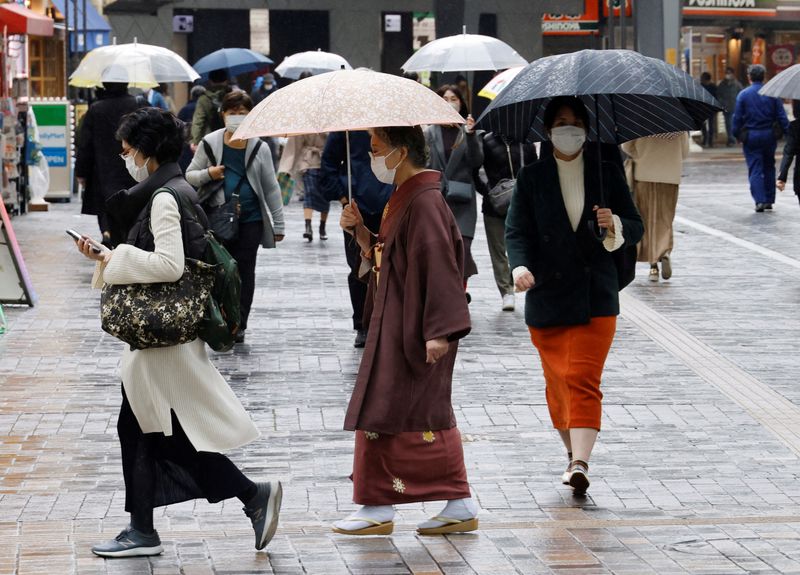By Leika Kihara and Tetsushi Kajimoto
TOKYO (Reuters) -Japan's economy averted recession but rebounded much less than expected in the fourth quarter as business investment slumped, a sign of the challenge the central bank faces in phasing out its massive stimulus programme.
While private consumption is holding up against headwinds from rising living costs, uncertainties over the global economic outlook will weigh on Japan's delayed recovery from the scars of the COVID-19 pandemic, analysts say.
The world's third-largest economy expanded an annualised 0.6% in the final quarter of last year after slumping a revised 1.0% in July-September, government data showed on Tuesday.
The increase in gross domestic product (GDP) was much smaller than a median market forecast for a 2.0% rise, due to a downswing in capital expenditure and inventory.
"From a negative growth in July-September, the rebound isn't very impressive," said Toru Suehiro, chief economist at Daiwa Securities.
"We can expect consumption to pick up as service spending stabilises. But it's difficult to project a strong recovery partly due to pressure from rising inflation," he said.
BOJ POLICY CHALLENGE
The weak data highlights the delicate task at hand for Kazuo Ueda, the government's nominee to become next Bank of Japan (BOJ) governor, as he plots a path to normalising the bank's ultra-easy policy without derailing a fragile economic recovery.
Policymakers hope a rebound in consumption, driven by savings accumulated during the pandemic, will last long enough for wages to pick up and cushion the blow on households from rising food and fuel costs.
With inflation exceeding the BOJ's 2% target, the outlook for the economy and wages will be key to how soon the central bank could phase out its massive stimulus programme.
"It might be hard for the BOJ to normalise ultra-easy policy this year as overseas economies are slowing," said Takeshi Minami, chief economist at Norinchukin Research Institute.
"The BOJ may have to wait until fiscal 2024 at the earliest."
While private consumption rose 0.5% and external demand added 0.3 percentage point to growth, capital expenditure was a drag on the economy, falling a bigger-than-expected 0.5%, the data showed.
Private inventories also shaved 0.5 point off growth as firms saw declining stock of automobile and raw materials.
RECESSION RISKS
For the full year, the economy expanded 1.1% compared with a 2.1% increase in 2021, the data showed.
Japan has seen an increase in the number of overseas visitors since ending in October some of the world's strictest border controls to prevent the spread of the COVID-19 pandemic.
Economy minister Shigeyuki Goto told reporters the economy was on course for a recovery as the pandemic's impact fades.
"Rising inflation and the global slowdown are risks," he said after the data release. "But corporate spending appetite hasn't cooled ... we're not too pessimistic about the outlook."

Some analysts, however, warn that global headwinds could weigh on the export-reliant economy and derail a fragile recovery by discouraging manufacturers to hike pay.
"With other advanced economies heading into recessions, we still expect net trade to drag Japan into a recession as well in the first half, especially since business investment is weakening faster than we had expected," said Darren Tay, Japan economist at Capital Economics.